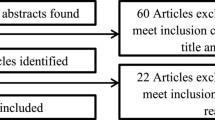Abstract
Background
Among health professionals, there is wide variation in the practice of disclosing a diagnosis of dementia to patients.
Purpose
The purpose of this study was to evaluate the effect of one theory-based and two pragmatic interventions on intention to perform three behaviors, namely (1) finding out what the patient already knows or suspects about their diagnosis; (2) using the actual words “dementia” or “Alzheimer’s disease” when talking to the patient (i.e., the use of explicit terminology); (3) exploring what the diagnosis means to the patient.
Method
Within an intervention-modeling process, members of old-age mental health teams in England were sent postal questionnaires measuring psychological variables. Respondents were randomized by team to one of four groups to receive: theory-based intervention; evidence-based communication; patient-based intervention; or no intervention (control). Interventions were delivered as pen-and-paper exercises at the start of a second postal questionnaire that remeasured the same psychological variables. The outcome measures were intention and scenario-based behavioral simulation.
Results
Responses were received from 644 of 1,103 (58%) individuals from 179 of 205 (87%) mental health teams. There were no significant differences in terms of intention or simulated behavior between the trial groups. The theory-based intervention significantly increased scores for attitudes to (p = 0.03) and perceived behavioral control (p = 0.001) for the behavior of “finding out what the patient already knows or suspects about their diagnosis.”
Conclusions
The intervention had a limited effect. This may be partly explained by clinical or methodological factors. The use of a systematic intervention modeling process allows clearer understanding of the next appropriate steps which should involve further evaluation of the interventions using an interactive delivery method in a less selected group of study participants.
Similar content being viewed by others
References
Ferri CP, Prince M, Brayne C, Brodaty H, Fratiglioni L, Ganguli M, et al. Alzheimer’s disease international. Global prevalence of dementia: a Delphi consensus study. Lancet 2005;366(9503):2112–7.
Department of Health. National framework for older people. London: Department of Health; 2001.
National Collaborating Centre for Mental Health. Dementia: A NICE-SCIE guideline on supporting people with dementia and their carers in health and social care (No. 42). Leicester and London: National Clinical Practice Guideline; 2007.
Audit Commission. Forget me not 2002. London: Audit Commission; 2002.
Bamford C, Lamont S, Eccles M, Robinson L, May C, Bond J. Disclosing a diagnosis of dementia: a systematic review. J Geriatr Psychiatry. 2004;19:151–69.
Jha A, Tabet N, Orrell M. To tell or not to tell—comparison of older patients’ reaction to their diagnosis of dementia and depression. Int J Geriatr Psychiatry. 2001;16:879–85.
Marzanski M. Would you like to know what is wrong with you? On telling the truth to patients with dementia. J Med Ethics. 2000;26:108–13.
McWilliams E. The process of giving and receiving a diagnosis of dementia: an in-depth study of sufferers’, carers’ and consultants’ experiences. PSIGE Newsl. 1998;64:18–25.
Bamford C, May C, Eccles M, Bond J. Dementia: views of clinicians in primary and secondary care (abstract). Gerontologist 2001;41:75.
Downs M, Clibbens R, Rae C, Cook A, Woods R. What do GPs tell people with dementia and their families about the condition? Dementia 2002;1(1):47–58.
Fortinsky RH, Leighton A, Wasson JH. Primary care physicians’ diagnostic, management and referral practices for older persons and families affected by dementia. Res Aging. 1995;17:124–48.
Heal HC. Disclosing a diagnosis of dementia: is age a factor? Aging Ment Health. 1998;2:144–50.
Johnson H, Bouman WP, Pinner G. On telling the truth in Alzheimer’s disease: a pilot study of current practice and attitudes. Int Psychogeriatr. 2000;12(2):221–9.
Rice K, Warner N. Breaking the bad news: what do psychiatrists tell patients with dementia about their illness? Int J Geriatr Psychiatry. 1994;9:467–71.
Rice K, Warner N, Tye T, Bayer A. Geriatricians’ and psychiatrists’ practice differs. Br Med J. 1997;314:376.
Vassilas CA, Donaldson J. Telling the truth: what do general practitioners say to patients with dementia or terminal cancer? Br J Gen Pract. 1998;48:1081–2.
Grimshaw JM, Shirran L, Thomas RE, Mowatt G, Fraser C, Bero L, et al. Changing provider behaviour: an overview of systematic reviews of interventions. Med Care. 2001;39(Suppl 2):II–2-II-45.
Foy R, Eccles M, Jamtvedt G, Grimshaw J, Baker R. What do we know about how to do audit and feedback? BMC Health Serv Res. 2005;5:50.
Walker A, Grimshaw JM, Johnston M, Pitts N, Steen N, Eccles MP. PRocess modelling in ImpleMEntation research:selecting a theoretical basis for interventions to change clinical practice. BMC Health Serv Res. 2003;3:22.
Collins LM, Murphy SA, Nair VN, Strecher VJ. A strategy for optimizing and evaluating behavioral interventions. Annals Behav Med. 2005;30(1):65–73.
Bonetti D, Johnston M, Pitts N, Deery C, Ricketts I, Bahrami M, et al. Can psychological models bridge the gap between clinical guidelines and clinicians’ behaviour? A randomised controlled trial of an intervention to influence dentists’ intention to implement evidence-based practice. Br J Dentistry. 2003;195:602–6.
Bonetti D, Eccles M, Johnston M, Steen IN, Grimshaw J, Baker R, et al. Guiding the design and selection of interventions to influence the implementation of evidence-based practice: an experimental simulation of a complex intervention trial. Soc Sci Med. 2005;60:2135–47.
Armitage CJ, Conner M. Efficacy of the theory of planned behaviour: a meta-analytic review. Br J Soc Psychol. 2001;40:471–99.
Sheeran P. Intention–behavior relations: a conceptual and empirical review. In: Stroebe W, Hewstone M, editors. European review of social psychology (vol. 12). New York: Wiley; 2002. p. 1–36.
Webb TL, Sheeran P. Does changing behavioural intention engender behaviour change? A meta-analysis of the experimental evidence. Psychol Bull. 2006;132(2):249–68.
Eccles MP, Hrisos S, Francis J, Kaner E, Dickinson HO, Beyer F, et al. Do self-reported intentions predict clinicians’ behaviour: a systematic review. Implement Sci. 2006;1:28.
Godin G, Belanger-Gravel A, Eccles M, Grimshaw J. Healthcare professionals’ intentions and behaviours: a systematic review of studies based on social cognitive theories. Implement Sci. 2008;3:36.
Eccles MP, Foy R, Bamford CH, Hughes JC, Johnston M, Whitty PM, et al. A trial platform to develop a tailored theory-based intervention to improve professional practice in the disclosure of a diagnosis of dementia: Study protocol [ISRCTN15871014]. Implement Sci. 2006;1:7.
Lecouturier J, Bamford C, Hughes JC, Francis JJ, Foy R, Johnston M, et al. Appropriate disclosure of a diagnosis of dementia: identifying the key behaviours of ‘best practice’. BMC Health Serv Res. 2008;8:95.
Foy R, Bamford CH, Francis J, Johnston M, Lecouturier J, Eccles MP, et al. Which factors explain variation in intention to disclose a diagnosis of dementia? A theory-based survey of mental health professionals. Implement Sci. 2007;2:31.
Foy R, Francis JJ, Johnston M, Eccles M, Lecouturier J, Bamford C, et al. The development of a theory-based intervention to promote appropriate disclosure of a diagnosis of dementia. BMC Health Serv Res. 2007;7:207.
Ajzen I. The theory of planned behaviour. Org Behav Hum Decis Process. 1991;50:179–211.
Bandura A. Social foundations of thought: a social cognitive theory. Englewood Cliffs, NJ: Prentice-Hall; 1986.
Gollwitzer PM. Implementation intentions: strong effects of simple plans. Am Psychol. 1999;54(7):493–503.
Crites SL, Fabrigar LR, Petty RE. Measuring the affective and cognitive properties of attitudes: conceptual and methodological issues. Personal Soc Psychol Behav. 1994;20:609–34.
Bandura A. Health promotion from the perspective of social cognitive theory. In: Norman P, Abraham C, Conner M, editors. Understanding and changing health behaviour: from health beliefs to self-regulation. Amsterdam: Harwood; 2000.
Michie S, Johnston M, Francis J, Hardeman W, Eccles M. From theory to intervention: mapping theoretically derived behavioural determinants to behaviour change techniques. Appl Psychol. 2008;57(4):660–80.
Sheeran P, Abraham C. Mediator of moderators: temporal stability of intention and the intention-behavior relation. Soc Personality Soc Psychol. 2003;29(2):205–15.
Acknowledgments
We are grateful to all members of mental health teams who participated in the study. This project was funded by UK Medical Research Council, Grant reference number G0300999. Jeremy Grimshaw holds a Canada Research Chair in Health Knowledge Transfer and Uptake. Jill Francis is 50% funded by the Chief Scientist Office of the Scottish Government Health Directorate.
Author information
Authors and Affiliations
Corresponding author
Rights and permissions
About this article
Cite this article
Eccles, M.P., Francis, J., Foy, R. et al. Improving Professional Practice in the Disclosure of a Diagnosis of Dementia: A Modeling Experiment to Evaluate a Theory-Based Intervention. Int.J. Behav. Med. 16, 377–387 (2009). https://doi.org/10.1007/s12529-008-9023-3
Accepted:
Published:
Issue Date:
DOI: https://doi.org/10.1007/s12529-008-9023-3




